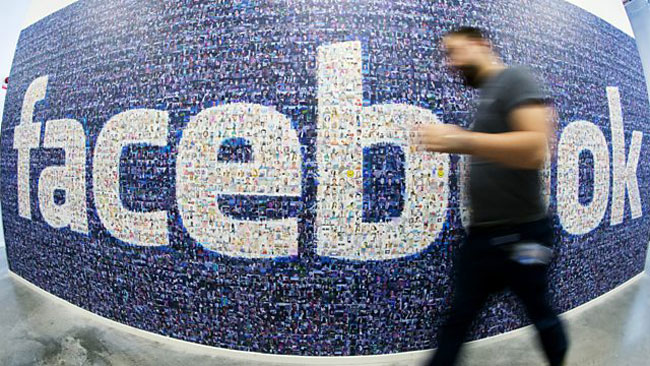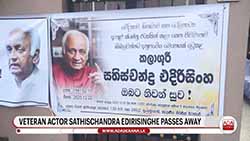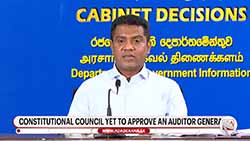Sri Lanka mulls new laws to curb hate speech and fake news on social media
April 12, 2018 08:30 pm
Sri Lanka is considering new legislation or amendments to exiting legislation in order to criminalize the spread of hate speech or fake news through social media, following in the footsteps of countries such as Malaysia, while the relevant draft laws are expected to be prepared within a month.
Minister of Telecommunication and Digital Infrastructure Harin Fernando stated that the government took several measures in the wake of the country’s recent experiences in the spread of hate speech through social media, which led to communal violence mainly in the Kandy district.
He stated that the Cabinet appointed a committee comprised of himself, Law and Order Minister Ranjith Madduma Bandara, Media Minister Mangala Samaraweera and also representatives of the Defence Ministry.
The minister stated that they are working together with the Telecommunications Regulatory Commission (TRC) in order to ensure that there is no reoccurrence of recent spate of incidents in Kandy.
“We have been constantly speaking and have put few remedies with the Facebook team that is working in India in order to prevent hate speech being spread in Sri Lanka,” he told Ada Derana.
However, he added that there are also certain other ‘remedies’ that they have been looking into with regard to monitoring social media such as Facebook and fake news, which he says is another serious issue that they are attempting to tackle. “We are looking at lots of models,” he said.
The minister stated that the government is looking at various legal aspects and could consider introducing anti-fake news laws similar to Malaysia.
Malaysia recently gazetted the controversial Anti-Fake News Act 2018, which carries stiff punishments of up to six years in prison and a fine.
Germany passed its anti-fake news law in January with the authorities given the powers to fine social media giants up to €50 million if they do not promptly remove illegal content from their sites.
Other countries such as Singapore and the Philippines are mulling over anti-fake news laws too.
Fernando stated that Sri Lanka’s Justice Ministry will be looking into the possibility of introducing such legislation and that a different team from the Attorney General’s department is currently working on certain legal restrictions that would prevent people from putting up hate speeches, fake news and spreading rumours on social media networks.
He stated there are several angels that the issue is being looked at including the various software available for online monitoring purposes. He stated that even social media giant Facebook is attempting to make changes to its platform to curb hate speech.
“Therefore I think there will be a lot of changes that can be expected in the coming days, maybe in the end of the month also hopefully the laws where the new method of taking serious action against hate speeches as well as fake news and unwanted things published on social media,” he said.
Harin Fernando said that the AG’s department has to draft the legal bill and once completed it would be presented to the Parliament for approval.
He highlighted that they are looking as to whether the current existing laws in the country are sufficient or whether they have to draft new laws and also that people have to be made aware as to how serious these laws are.
“All those things are being looked into at the moment by the AG’s department,” he said, adding that hopefully they should have the results by about another month. “We are hoping to have a deadline by a month.”
The minister said that the government is also monitoring the legislative and policy decisions taken by other countries to tackles these issues.
The Sri Lankan government imposed a week-long nationwide ban on social media including Facebook, after days of violence targeting Muslims in the Kandy district.
It remained in effect until Facebook officials traveled to Sri Lanka and pledged to work with the government “to prevent hate speech and misuse of the platform.”
Sri Lanka is not the only country that the social media giant has been blamed over failure to filter hate speech and the promotion of violence.
U.N. officials investigating the genocide in Myanmar recently said Facebook has had a role in the tragedy.
“It has ... substantively contributed to the level of acrimony and dissension and conflict, if you will, within the public. Hate speech is certainly, of course, a part of that. As far as the Myanmar situation is concerned, social media is Facebook, and Facebook is social media,” Marzuki Darusman, chairman of the U.N. fact-finding mission on Myanmar, said in March.
Facebook CEO Mark Zuckerberg on Tuesday apologized to the US Congress over spread of ‘fake news,’ hate speech through the social media platform.
“It’s clear now that we didn’t do enough to prevent these tools from being used for harm,” Zuckerberg said at a joint hearing of the Senate Judiciary and Commerce committees.
“That goes for fake news, foreign interference in elections, and hate speech, as well as developers and data privacy. We didn’t take a broad enough view of our responsibility, and that was a big mistake,” he continued.
“It was my mistake, and I’m sorry. I started Facebook, I run it, and I’m responsible for what happens here.”
Zuckerberg spent the rest of his opening remarks detailing previously released details about the Cambridge Analytica scandal, including steps his company is taking to protect consumer data.
But the company’s CEO has now revealed another fact that is sure to worry anyone who doesn’t use Facebook.
Zuckerberg, under stern questioning by US legislators, said Facebook collects information on consumers who are not registered as users, acknowledging something that has been reported but not publicly spelt out by the company.
“In general we collect data on people who are not signed up for Facebook for security purposes,” Zuckerberg said on Wednesday in a hearing about the social network’s privacy practices in Washington before the House Energy and Commerce Committee.
- With inputs from agencies












